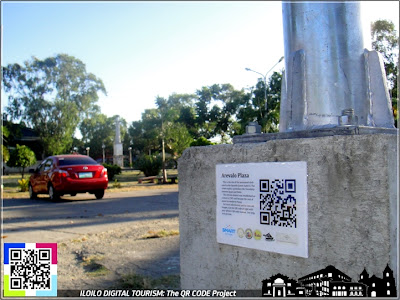
Special QR CODE cupcakes from Tinapayan bakeshop
TOURISTS visiting Iloilo now have a handy guide to places to go and things to try as Philippine telecommunications leader Smart Communications, Inc. and new media startup InnoPub Media unveiled its digital tourism program in the province.
Special markers containing QR or quick response codes have been placed in select heritage and tourism areas in Iloilo. When scanned with a phone or tablet, the QR codes trigger the download of information about the tourism site.
To be able to download information, however, the gadget needs to be connected to the Internet and have a QR code scanner, which can be downloaded for free in the phone’s application market.
The program also includes a mobile guide to Iloilo, which contains a listing of places to go and things to try as well as important contact numbers. The guide can be accessed via phone scanning of special posters and standees at the airport, Iloilo City Gallery and various establishments.
SPECIAL MARKERS. Some heritage and tourism sites in Iloilo contain special markers like these. When scanned with a phone, the markers trigger the download of information about the sites.
 |
| QR Code for the plaza of La Villa Rica de Arevalo |
 |
| InnoPubs Media's Max Limpag tries the QR Code for the Jaro Cathedral |
The program also includes a mobile website that allows tourists to view an interactive map of places to go based on their locations. To view suggested areas, tourists need to turn on their gadget’s global positioning system or GPS, open myguide.ph and enable location sharing.
 |
| Iloilo City Mayor Jed Patrick Mabilog samples the QR code as InnoPub founder Max Limpag, Smart Communications' Nick Wilwayco and Atty. Maria Jane Paredes look on. |
“The digital tourism program ushers Iloilo City into the 21st century with its possibilities of digital technology. The power behind this is multi-institutional collaboration including government and private, individual and institutional interdisciplinary expertise,” said heritage advocate Eugene Jamerlan, a member of the team behind the program.
“The QR code program delivers information in an instant, right there where you need it,” Jamerlan said.
 |
| Launching of the ILOILO DIGITAL TOURISM project at the Iloilo City Hall Penthouse |
The program was launched on Thursday, March 21 at the Penthouse of the Iloilo City Hall.
“Today’s technologies allow us to put a layer of information on real life that is accessible through mobile devices,” said InnoPub Media co-founder Max Limpag, “This digital tourism project showcases that and harnesses its power to support a key sector of our country’s economy – tourism.”
The QR code, e-guide, and online map projects will start with Iloilo City and spread out to the rest of the province. QR codes and electronic guidebooks add to the visitor experience by providing them relevant information about Iloilo’s historical, cultural, and other attractions.
 |
| DOT-6 Regional Director Atty. Helen Catalbas (left) tries the QR Code as Smart Communications Inc. Public Affairs head for VisMin Atty. Maria Jane C. Paredes observes. |
This Digital Tourism Project is a collaboration among the City and Provincial Governments of Iloilo, Smart Communications, Inc., InnoPub Media, and Iloilo private sector partners (Iloilo City Cultural Heritage Conservation Council, Iloilo Heritage Foundation Inc., UPV Center for West Viosayan Studies).
/press release





